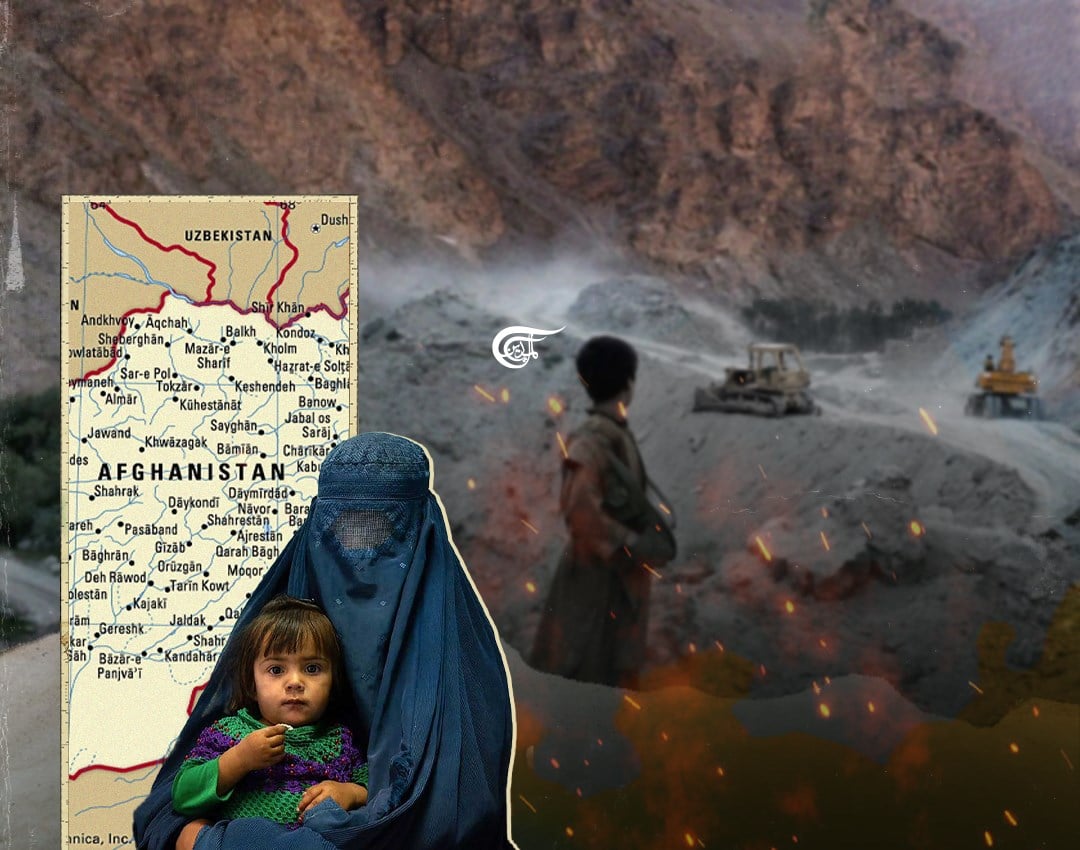Afghanistan in the Abyss (II): News from the Realm of the Taleban
The US and the West may have been condemned and blamed for what they ultimately wreaked on Afghanistan… yet, all that happens in Afghanistan continues to be seen, interpreted, and disseminated largely from a Western neoliberal point of view.
The opposition and the armed resistance
Apart from small groups of women who occasionally take to the streets, brandishing small placards with their demands and chanting a few slogans, only to be beaten, arrested, and abducted by the Taleban militias… there is as yet no significant formation of political opposition inside Afghanistan.
Some former politicians and officials of the toppled pseudo-republic who absconded abroad try to play an oppositional role from outside, but all they press for is "talks with the Taleban," which the latter tersely wave off. This "opposition in exile" is divided into small groups and is not organized. They all suffer from extreme untrustworthiness and unpopularity among the population. Their demand is the same of "the international community": inclusiveness in government and by that they mean that the Taleban should include them in the government. The Taleban, however, reject them, pointing to a few hand-picked non-Pashtun Taleban in their ranks as proof of the "inclusiveness" of their government and see their demand as interference in the internal affairs of their state.
What drives these fugitive kleptocratic elites and politicians is more the concern for their inherited wealth and property that they managed to plunder during the 20-year rule of the great Kleptocrator (USA).
The armed resistance in Panjshir and Andarab, in the rugged valleys of the Hindu Kush, arose from a spontaneous "natural" reaction by sections of the population in these regions. Some senior members of the ousted government and military, who ethnically belong to the population of these regions, relocated there – headed by Ahmad Massoud, the son of Ahmad Shah Massoud, and Amrullah Saleh, the former intelligence chief and "vice president" in Ghani's government.
Ahmad Massoud was never a public official in the Ghani and Karzai regimes, but he is a pupil of the regime and the British military academy. His limited popularity (mostly among the Persian-speaking population) is owed to his clean record (a rarity in Afghanistan) and the status of "son of the national hero" Ahmad Shah Massoud. However, he has neither a viable ideology nor a clear political program nor any political organization to form a proper opposition to the Taleban. The "resistance" was also initially conceived as a mere opposition movement. However, when it became clear that the Taleban had no understanding of the concept of "opposition" and saw it instead as a rebellion, the opposition was left with two options: either accept the Taleban offer and join them (knowing full well that in such a case, as members of the Tajik population in a Pashtun-dominated state, they would play second fiddle – as was always the case in Afghanistan in the past)… or join the armed resistance. They chose the second option, because the real basis of this resistance is the age-old ethnic conflict (between Pashtuns and others)… but that is an issue they do not talk about or take a clear position on.
Amrullah Saleh is a CIA disciple and agent – something he used to be proud of. Both Ahmad Massoud and Saleh were expecting support from the USA and NATO, but now they can feel bitterly disappointed. Special Representative for Afghanistan Tom West made it quite clear that the USA will not support resistance against the Taleban for now, "At the moment, we are not supporting armed opposition in Afghanistan. We would discourage other countries from doing so, as well."
The other ethnic groups – the Uzbeks, Turkmen, Hazara, etc. – have not joined the Tajik resistance so far. The reasons for this are complex and varied, but an elaboration of this would go beyond the scope of this article. It is only worth mentioning here that all non-Pashtun population groups – apart from those in Panjshir and Andarab – have no leadership. Their old leadership class disqualified itself for having participated in the most corrupt regime ever. Many are abroad or are under foreign influence or represent the interests of the feudal lords and the reactionary clergy...
How long the lone fighters in the mountains of Panjshir and Andarab and elsewhere can continue their struggle all depends on their leadership and on foreign support.
Tajikistan is so far the only country providing limited support on a political level to the resistance front. Russia and Iran, which played a major role in supporting the Taleban during the US/NATO occupation, initially hoped for a positive interaction with the Taleban regime after the takeover in 2020, but they made no headway with any of their demands (e.g. an "inclusive government", a stop to drug production and smuggling, some clear and confidence-building action against the Central Asian Islamist groups who are stationed among the Taleban). China, which also had initiated some economic activities with the Taleban, has withdrawn from Afghanistan after the attack on Chinese citizens in Kabul.
Once again, the field in Afghanistan has been left to the USA, which is busily working on its comeback. The concerns of neighboring states and Russia for their security and interests are only met with a "promise" from the Taleban that no harm will come to them from within Afghanistan, but for these states, this is not sufficient.
India alone seems to have succeeded in gaining some influence over certain Taleban leaders (such as Mulla Yaqoub). How far this influence extends is not yet clear. The emerging tensions between the Taleban regime and Pakistan may strengthen India's position.
The instrumentalization of women and the Talebanization of the education system
The position of women in Afghanistan was not that great even before the Taleban's rise to power, but after the return of the Taleban, it deteriorated drastically.
The young generation during the 20-year US/NATO occupation had become easy prey for the propagandists and propagators of the neoliberal ideology, its mindset, and "western values", which flooded the country in the form of "NGOs", foreign development organizations, and private individuals. The concepts of human rights, gender equality, freedom of expression, democracy, etc. were used as bait to entice young women and men who were granted relative freedom in this period. Numerous TV and radio stations (more than 30 TV stations and around 80 radio stations), daily newspapers, and other print media were instituted, and these naturally promulgated the views and intentions of their founders or financiers. At first glance, this seemed like a positive development, as some of these media wanted to perform an educational service and disseminate the above-mentioned principles and values with honest intentions.
But the substance of these media organs was the neo-liberal ideology that has engulfed the entire world, that propagates the beneficence and superiority of the western way of thinking and western lifestyle, and that fortifies the US hegemony. The consequences of the influence of these media organs became particularly apparent after the collapse of the US vassal state and the transfer of power to the Taleban. The US and the West may have been condemned and blamed for what they ultimately wreaked on Afghanistan… yet, at the same time, all that happens in Afghanistan (and in the world) continues to be seen, interpreted, and disseminated largely from a Western neoliberal point of view. Statements made by celebrities and stars such as Angelina Jolie about girls in Afghanistan and their predicaments are publicized and hailed as significant news items. The platitudes of Western politicians are repeatedly spewed out. Analyses are requested from "experts" who all tow the same line. Hollywood propaganda clips are trumpeted with great fanfare. A mere utterance from Hillary Clinton or Obama is presented as some impactful, world-shaping announcement. The " woke" campaigns of gender, climate, and LGBTQ+ activists are propagated with blind deference. An inflationary term that is constantly bandied about, especially by many women's groups, is "the international community".... meaning the USA and its vassals.
So, just about everyone – women's groups, activists, experts, journalists, politicians, every Tom, Dick, and Harry – is appealing to the Taleban and asking them to change to and give up their beliefs that lie embedded in the marrow of their bones, to adapt to the "international community", and to forget what they have been fighting for all these years.
The great commotion over the ban on education and employment for women and girls has now reached its climax… and it is only a matter of time before only one thing can possibly happen: the Taleban lift the ban or relax it gradually, and in return (they always demand a "deal"), they will be internationally recognized and their power will be consolidated. Under what circumstances, how and where women will be then allowed to work other than at home will remain a bureaucratic and administrative matter and is thus, in fact, purely an internal affair of the Taleban regime. The conditions under which women (and also men) can study and acquire education in schools and universities have already been established. You can get a picture of this here.
Thus, according to the Taleban's education agenda, the next generation will become a pure and utter "Taleban generation". If the US has no other use for the Taleban, will an internationally recognized, peaceful "Talebanistan" be a "Brave New World" project, a future tourist attraction?

 Tariq Marzbaan
Tariq Marzbaan
 9 Min Read
9 Min Read












